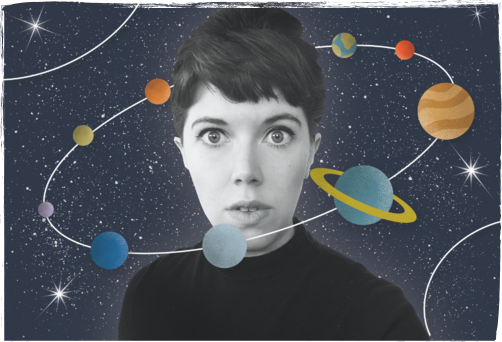Corey Spence
Just as the night sky glimmers brightly with stars, much of the appeal Celestial Nobodies offers is thanks to its vibrancy. Candy-coloured blues, purples, and reds bathe the stage as we meet the planets (courtesy of designer Isadora Lao) and three large and beautiful starry mobiles caress the space, setting a great atmosphere for our voyage(r) into the evening (set design also by Telfar).
We see this liveliness translate into the performances, too, especially when Telfar’s script takes advantage of metaphor and contrast. The poeticism of Earth’s (Courtney Rose Brown) cry for help is flugent and saddening. Brown breathtakingly oscillates between a delicate nervousness and intense fear and uncertainty. Laurel Mitchell’s Uranus sits firmly at the comic end of the script’s spectrum. The delivery feels natural; we feel comfortable and included. And when we start to notice the undercurrents, how tiring the mispronunciation of her name has become, the monologue is afforded much more weight and meaning.
Other orbits that really stood out included Pluto (Q Walker) and Venus (El Yule). I admired the intensity behind Walker’s monologue immediately, from the moments of tears to the sharp statements of a planet scorned. Pluto’s plea carries great power, an attempt to make us cognisant of how our insistence on categorising literally everything damages those we set out to label and confine. While the monologue sets up the theme well, it does the opposite to the tone. As an opener for the show, Pluto comes off as almost too confrontational and hurt, leaving no warmth on the stage. Since we’re not yet familiar with the show’s rules or point, we don’t fully acknowledge the gravity of what Pluto is saying, or the poignancy of Walker’s words and performance, because we feel ‘told off’. I’m also enamoured by Yule’s portrayal as Venus, which is precisely the point of her monologue, and the problem the monologue itself tries to address. The sultry performance flicks between sass, venom, and truth with her witty remarks, confident steps, and vulnerable custom change. It is an intelligent approach in dealing with gawking, celebrity, and permission.
While I enjoy the atmosphere that the heavenly performers and clever script gestate, Celestial Nobodies needs more polish. Opening night is speckled with lighting cues throughout the show that feel far too late, aimless wandering around the stage instead of clear blocking in the earlier parts of the show, the literal centrepieces of the set (the mobiles) go largely underused (except by Annica Lewis’ Mercury), and a messy dance number during Sun’s (Aimee Sullivan) song where too many of the performers are either in or out of sync, making neither feel correct or planned. And while the powerful moments and exuberant laughter are still at the front of my mind, that makes these overlooked details stand out like an elliptical orbit (no offence, Pluto!). The show's imperfections are earnest, and in many ways these reflect our own impurities, but they are sometimes too craterous, noticeable from orbit. More attention to these details would really give the show more force.
My time with the heavenly bodies of our Milky Way was a blast, and their stories remind us of individuality. It is a love song to uniqueness and self-care and simultaneously an appeal for tolerance and respect. While it’s not quite the Big Bang, Celestial Nobodies paints its point across the stars, communicating how we should be, as Matteini-Roberts so rightly suggests in the programme, “bravely, unashamedly” ourselves.
As part of the Fringe Festival, Celestial Nobodies is currently showing at BATS Theatre until Thursday 18 March. Visit their website for inquiries or to book tickets.






